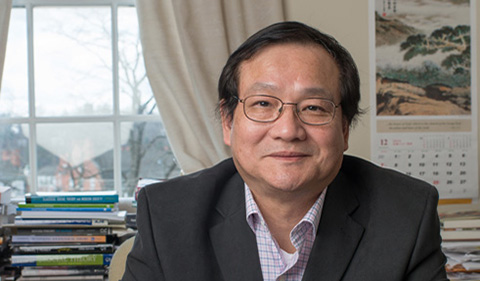
Dr. Jieli Li
Dr. Jieli Li, Professor of Sociology in the College of Arts & Sciences at Ohio University, chaired a panel on “Chinese Dream” and reform and presented a research paper on “Wallerstein’s World System and Challenges of ‘Chinese Dream and Peaceful Rise’” at the 22nd Association of Chinese Professors of Social Sciences International Conference in October 2016.
The conference was held in collaboration with the Metropolitan State University of Denver and its affiliated Confucius Institute. The theme of the conference was Diversity in a Globalized World: Co-existence and Cooperation.
The Association of Chinese Professors of Social Sciences in the United States (ACPSS) is non-profit, non-political professional organization founded in June 1995 by a group of Chinese professors and researchers of social sciences and humanities residing in North America. The organization aims to promote and protect the rights and interests of Chinese scholars of social sciences and humanities in academic institutions in the United States and Canada; encourage and sponsor interdisciplinary research endeavors in the areas of social sciences and humanities; participate and coordinate academic exchanges among scholars; promote the development of social sciences in mainland China; and contribute to China’s modernization and positive U.S-China bilateral relations. Membership exceeds 500 scholars across a wide range of disciplines and the advisory committee is formed by internationally renowned scholars.
Given their Chinese cultural heritage background, both Chinese and Western academic training, and wide range of specialties, ACPSS members are uniquely positioned to promote scholarly exchanges between China and the West, develop innovative interdisciplinary projects, coordinate scholarly efforts, and provide valuable advices to policy-makers.
Li is also the editor of the organization’s official journal, American Review of China Studies (ARCS), which is peer-reviewed and published bi-annually. Founded in 2000, ARCS is dedicated to its long-standing mission of providing a platform for intellectual discourse and inspiration among scholars who are interested in the areas of China studies. ARCS publishes original works that cover a broad range of China studies in the diverse disciplines of the humanities and social sciences and the editors particularly welcome submissions of critical and applied research using quantitative, qualitative, interpretative, historical and comparative methods.
Abstract: Wallerstein’s world-system theory is applied to the Chinese Phenomenon featuring its quick rise to be a global power and the prevalence of the “Chinese Dream” aimed to revive its past glory and rebuild the nation’s confidence and pride. The author contends that the “Chinese Dream” – a manifestation of new value orientation — cannot be pursued within the confines of limited ideology because doing so could possibly give rise to a runaway ethnonationalism that may result in a dangerous inter-state conflict. The right path for China’s “peaceful rise” is to locate the Chinese dream in the global context to make it fully integrated into the core value of modern world system. According to Wallerstein, the core value of modern world system lies, first of all, in a cultural and ideological tradition that originated from and gradually triumphed after French Revolution of 1789. The French Revolution propagated two then-unprecedented ideas: (1) political change was not exceptional but normal thus constant, and (2) the “sovereignty” – the right of the state did not reside in a monarch but in the “people” (in the form of republic). On the other hand, according to Wallerstein, the world system which is composed of spatialized class relations, as nation-states are stratified by their power ranking into the core, semi-periphery, and periphery, operates in a quite dynamic manner in the sense that such stratification system is subject to the upward or downward mobility of nation-states in pursuit for power-prestige. For example, British Empire started emerging after it defeated France world-systematically first in 1763, and then went on from 1792 to 1815. American Empire may have started as early as in 1873 and became consolidated in 1945. From the above world-system perspectives, the real challenges as well as opportunities for the realization of the “Chinese Dream” would come up within rather than outside the world system. Only by integrating into the world system can China’s “peaceful rise” be fully comprehended and embraced by the international community.



















Comments